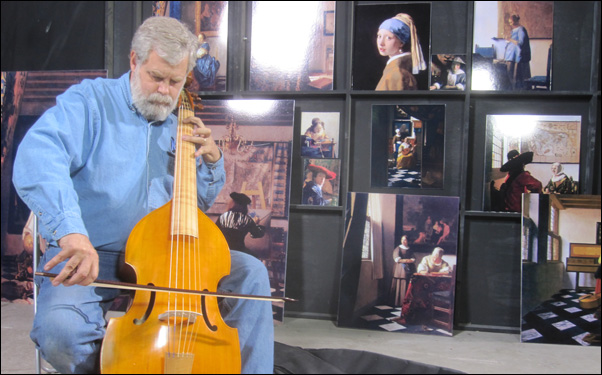“Tim’s Vermeer” opens with the image of Tim Jenison hunched over a canvas, applying the tiniest, detailed brushstrokes as he tells the camera, “I’m not a painter,” a striking dichotomy that makes it ideal subject matter for Penn and Teller, the magician duo who go behind the camera here and have largely avoided being lumped in with their Vegas brethren by teaching audiences to be skeptical of what they’re seeing, even if they’re the ones doing the deceiving.
Although “Tim’s Vermeer” is not all that different from an extended episode of the duo’s Showtime series “Bullshit” in which the two would consult experts to debunk what’s been accepted as common knowledge, they step back to let Tim’s pursuit of perfection take center stage. Penn pops up occasionally to fill in biographical details about Jenison, an inventor who would teach himself the things he didn’t understand even as a kid and subsequently developed groundbreaking television equipment that could fund his wide array of hobbies. It was after reading David Hockney’s “Secret Knowledge,” which posited that the great Dutch painter Johannes Vermeer painted with the aid of a then-revolutionary Camera obscura, that Jenison’s mind began to reel since Vermeer’s realism was thought to come only by his eye and the available light. Soon enough, Tim was picking up a paintbrush himself.

In limiting itself to Tim’s individual pursuit, “Tim’s Vermeer” can feel as if doesn’t do nearly enough with this notion, settling into a third act where it becomes an endurance test for Tim. A single line of narration where Penn asks “Is Tim an inventor or an artist” seems too reductive for the ideological query the film poses, particularly when you’re watching Tim’s passion drive his tireless work as a scientist. (Although one could argue that’s an answer in itself, as Tim might allow, the sample in this experiment is maddeningly small.) Yet this hardly takes away from the sheer delight of “Tim’s Vermeer,” which is every bit the magic trick that Penn & Teller are known for conjuring, except in seeing Tim apply one precise brushstroke after another, there’s no question as to how it’s done, though there still remains a great deal of wonder. As it turns out, all the time Tim spends disproving he’s not an artist amounts to the dedication and commitment required to truly create a masterpiece.
“Tim’s Vermeer” opens on December 6th in New York at the Lincoln Plaza Cinemas and on December 13th in Los Angeles at the Landmark.




